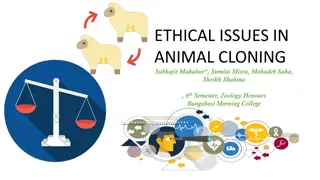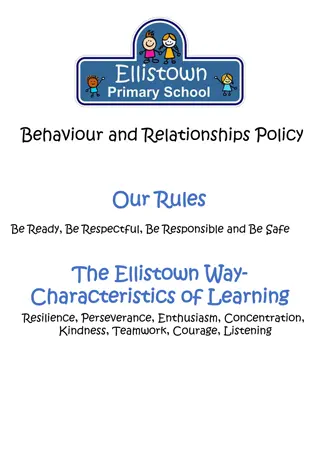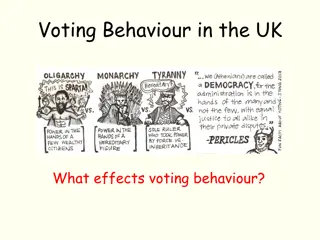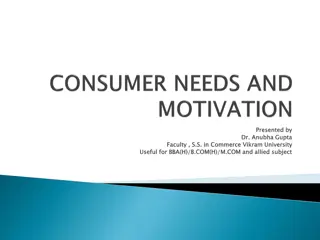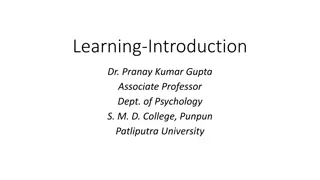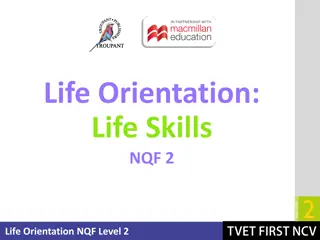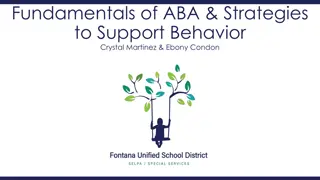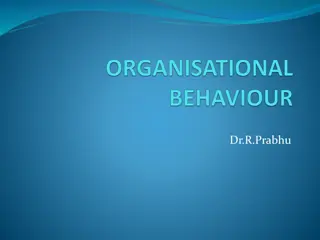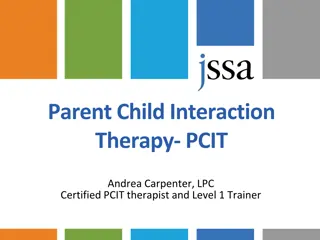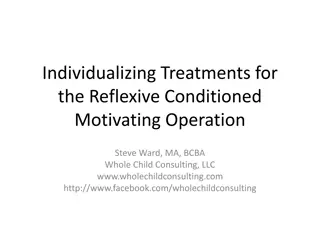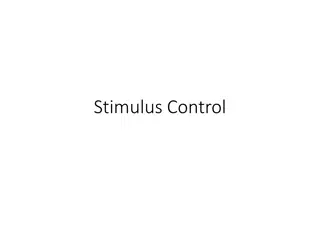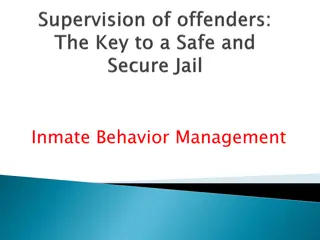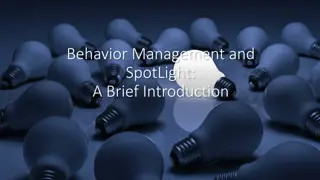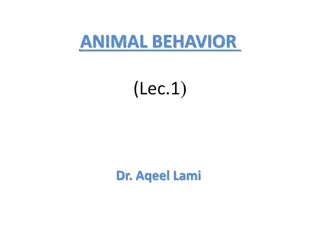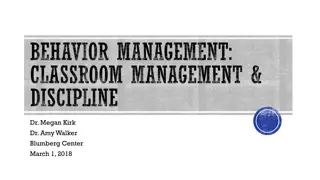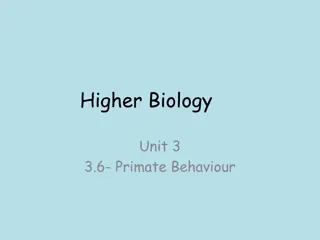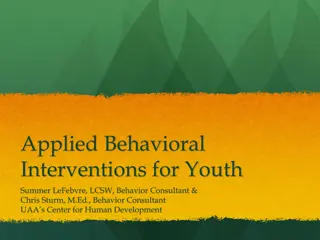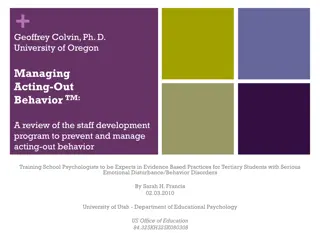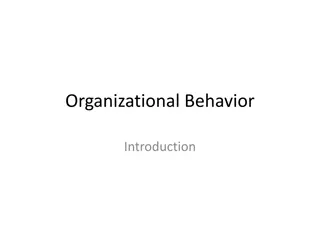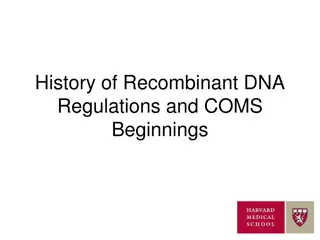Positive Behavior Support Interventions in Education
Learn about Tier 1 Positive Behavior Interventions & Supports (PBIS) developed by California State University and LA Unified School District. Explore evidence-based strategies like effective transitions, praise, choice-making, and establishing routines to promote positive behavior in students. Disco
1 views • 10 slides
Function Based Thinking
Function-based thinking in Missouri Schoolwide Positive Behavior Support, emphasizing data-based decision-making, mission clarity, and effective teaching practices. Understand how behavior is related to the environment and how environmental interventions play a key role in shaping expected behaviors
6 views • 27 slides
Addressing Predatory Behavior in the Fellowship
Predatory behavior, especially towards vulnerable members, is a concerning issue in the fellowship. This behavior includes unwelcome advances, exploitation of power dynamics, and institutional sexism. The discussion on predatory behavior necessitates honest dialogue and a united approach for a safer
3 views • 13 slides
Understanding Human Behavior: Foundations and Complexity
Human behavior encompasses the actions and interactions of individuals influenced by factors like genetics, culture, and situational contexts. It involves observable overt behaviors as well as hidden covert behaviors, with a dynamic interplay between individuals and their environments. Psychologists
8 views • 20 slides
GD Bart Puppy Test: Behavior Scoring System Overview
The GD Bart Puppy Test is a standardized behavioral scoring system designed for puppies at 8 weeks of age, focusing on 21 test components to predict success in canine behavior. Conducted by a team of 3 people, the test evaluates stress signals and responsiveness levels to various stimuli. Multiple e
6 views • 15 slides
Understanding the Role of Board-Certified Behavior Analysts in Supporting Students with Autism in PA School Programs
Pennsylvania Training and Technical Assistance Network (PaTTAN) plays a crucial role in supporting students with autism through the efforts of Board-Certified Behavior Analysts. The increasing number of students eligible for IEPs under the definition of autism necessitates skilled educators who can
0 views • 20 slides
Exploring Ethical Issues in Animal Cloning and its History
Animal cloning involves creating genetically identical replicas of cells or organisms, with advancements being made in therapeutic cloning and gene cloning. The history of animal cloning dates back to the successful cloning of sheep like Dolly in 1996. The cloning procedure involves collecting cells
0 views • 21 slides
Influencing Factors on Voting Behavior: A Comprehensive Analysis
In the realm of voting behavior, factors such as media, social class, age, gender, and more play critical roles. This essay delves into the complexity of factors influencing voting behavior, assessing their relative importance and the balance of their impact. The discussion includes models of voting
0 views • 12 slides
Behavior and Relationships Policy at Ellistown Primary School
Ellistown Primary School aims to create a safe and respectful environment where everyone is ready to engage in learning. The Behavior and Relationships Policy emphasizes positive behavior reinforcement, clear boundaries, and promoting self-esteem. It focuses on fostering good citizenship, teaching s
0 views • 11 slides
Understanding Psychological Theories of Criminal Behavior
Psychologically-based criminologists attribute criminal behavior to individual factors such as negative early childhood experiences and inadequate socialization, leading to criminal thinking patterns and incomplete cognitive development. Probation and parole practices are influenced by rehabilitatio
0 views • 30 slides
Understanding Voting Behavior in the UK
Voting behavior in the UK is influenced by various factors such as social class, age, location, single issues, party leadership, and media impact. Traditionally, voting behavior was predictable, but recent trends show a shift in party loyalty. Factors such as social class have historically played a
0 views • 26 slides
Understanding Consumer Behavior and Motivation in Purchasing Decisions
Consumer behavior refers to the process where individuals make decisions on purchasing goods and services. Motivation plays a crucial role in driving individuals to take action towards fulfilling their needs and desires. This motivation arises from a state of tension caused by unmet needs. Different
1 views • 14 slides
Understanding Learning: The Cornerstone of Psychology
Psychology delves into the study of behavior and mental processes, with a primary focus on understanding the mental processes underlying behavior. Learning, a key mental process, leads to changes in behavior through maturation and experiences. Defined as a permanent change in behavior or potential i
1 views • 34 slides
Understanding Ethical Behavior in College and Personal Life
Exploring ethical behavior in college and personal life is essential for fostering a peaceful existence. This module delves into the principles of ethical and moral behavior, highlighting the importance of good values and standards. It also identifies various forms of unethical behavior and provides
0 views • 22 slides
Understanding Fundamentals of ABA & Behavior Support Strategies
ABA utilizes evidence-based interventions to enhance skill acquisition and reduce challenging behaviors, focusing on socially significant areas of development. The content covers key concepts such as defining ABA, ABCs of behavior, functions of behavior, and effective strategies to support behavior.
0 views • 29 slides
Understanding Organizational Behavior and Characteristics
Organizational behavior explores how individuals behave in various contexts such as child, IPS officer, businessman, etc. An organization is a consciously coordinated unit comprising two or more individuals working towards common goals. Characteristics of an organization include deliberate creation,
2 views • 41 slides
Parent-Child Interaction Therapy (PCIT) Overview
Parent-Child Interaction Therapy (PCIT) is an evidence-based practice widely used to address disruptive behavior in young children. Developed in the 1970s by Dr. Shelia Eyberg, PCIT has gained international recognition and is offered in various countries. It combines elements of attachment theory, p
1 views • 35 slides
Understanding Consumer Behavior in Marketing
The design of a marketing program starts with understanding consumer behavior. Consumers, as the end users, play a crucial role in shaping market trends. Producers seek insights into consumer personas, market behaviors, and influencing factors. Management focuses on the consequences of consumer beha
2 views • 26 slides
Understanding Psychology: The Science of Behavior and Mental Processes
Psychology is the scientific study of behavior and mental processes. Psychologists study both observable behavior and private mental processes. The primary goals of psychology are to describe, understand, predict, and control behavior. Different branches of psychology, such as applied psychology, cl
2 views • 29 slides
Individualizing Treatments for Reflexive Conditioned Motivating Operation
Understanding the importance of individualizing treatments for escape/avoidance behaviors in individuals with ASD. Factors such as behavior change speed, alternative repertoires, and aversive stimuli considerations are crucial for effective intervention. Generic interventions may not address behavio
1 views • 47 slides
Understanding Stimulus Control in Behavior
Behavior under stimulus control means its occurrence is influenced by the presence of certain stimuli. This principle explains how the likelihood of a behavior happening depends on specific cues in the environment. When a behavior is under stimulus control, it is more likely to occur in the presence
6 views • 56 slides
Understanding Inmate Behavior Management in Correctional Settings
Inmate Behavior Management in correctional facilities involves supervising inmates, implementing corrective discipline, and fostering a fair and consistent environment. It emphasizes the importance of behavior management plans, identifying undesirable traits in supervision, and passing educational a
0 views • 19 slides
Understanding Behavior Management and SpotLight System in Schools
This overview introduces Behavior Management and SpotLight in educational settings, emphasizing the importance of a positive behavior intervention system like SpotLight for effective school-wide management. It discusses the features, benefits, users, and methods of utilizing SpotLight to address var
0 views • 13 slides
Understanding Human Behavior: Foundations and Factors
Human behavior is a multifaceted subject influenced by genetic makeup, culture, and individual values. It encompasses both overt actions and covert thoughts, a product of the individual and environmental factors. Psychologists study behavior from visible (overt) actions like playing football to inne
0 views • 20 slides
Understanding Normal and Abnormal Behavior: Perspectives and Definitions
Normal behavior varies from person to person and society, influenced by individual preferences and societal norms. Abnormal behavior is characterized by an inability to function effectively or personal discomfort. The concept of normality and abnormality in psychology raises complex questions about
2 views • 8 slides
Understanding Human Behavior: Insights for Social Workers
This material delves into the intricacies of human behavior, exploring factors influencing behavior such as heredity, environment, intelligence, needs, and motives. It covers the concept of human behavior, stages in life from conception to old age, and theories of human development by eminent psycho
2 views • 71 slides
Understanding Animal Behavior and Ecology
Animal behavior encompasses a range of activities such as feeding, breeding, and social interactions. Ethology focuses on studying behavior in natural environments, while behavioral ecology examines ecological aspects like predator-prey interactions. Sociobiology delves into the evolution of social
3 views • 5 slides
Understanding Primate Characteristics: Movement, Dexterity, and More
Primate characteristics encompass a range of physical traits tailored for their environments, like adept movement abilities and dexterity in their hands and feet for grasping objects. Their unique skeletal structure allows for flexibility and skilled locomotion. Learn about the fascinating features
0 views • 11 slides
Understanding Behavior Management in Classroom Settings
Explore the essential topics of behavior management, classroom strategies, and discipline in educational settings. Delve into the functions of behavior, impact of trauma on learning, and effective management techniques. Learn how to identify underlying reasons for student behaviors, discuss behavior
0 views • 76 slides
Understanding Primate Behavior: Insights into Social Dynamics
Primates, including lemurs, monkeys, apes, and humans, exhibit complex social behaviors such as parental care, communication through language, and conflict resolution strategies. They invest significantly in the upbringing of their offspring, fostering skills essential for survival through play and
0 views • 16 slides
Targeting Emotions to Facilitate Behavior Change in Older Adults
Efforts in changing health behavior have traditionally focused on social and cognitive factors, but recent evidence highlights the importance of affective states in decision-making and behavior change. Janey Peterson discusses the role of emotions in achieving and sustaining behavior change to benef
0 views • 11 slides
Understanding ChIP-seq Data Analysis in Primate iPSCs
Analysis of ChIP-seq data in primate iPSCs reveals insights into regulatory differences, experimental systems, read subsampling, QC analysis, peak classification, and cross-species comparisons for transcriptional regulation studies. Balanced designs and functional validation of iPSCs contribute to a
0 views • 33 slides
Grading Criteria for Effort and Behavior in Educational Reporting
Effort and behavior in educational settings are evaluated based on criteria ranging from Excellent to Causing Concern. Pupils demonstrating excellent behavior show respect, responsibility, and positive engagement in learning. Those with good behavior exhibit cooperation and respect for others, albei
0 views • 9 slides
Understanding Applied Behavior Analysis (ABA) for Youth Interventions
Applied Behavior Analysis (ABA) is a science focusing on improving human behavior by increasing desired behaviors, teaching new skills, and generalizing behaviors. ABA emphasizes observable behaviors, measurement of behavior change, and the use of interventions in various settings like classrooms an
0 views • 25 slides
PBIS Expectations and Behavior Flowchart
The PBIS flowchart outlines behavior expectations and interventions for minor and major incidents in a school setting. It covers disrespectful behavior, disruption, defiance, property damage, theft, possession of weapons, and more. The flowchart guides teachers and staff on managing and addressing s
0 views • 6 slides
Managing Acting-Out Behavior: A Staff Development Program Review
This review discusses a staff development program created by Geoffrey Colvin, Ph.D., from the University of Oregon, focusing on preventing and managing acting-out behavior in students with emotional disturbance or behavior disorders. The program includes video presentations, strategies for behavior
0 views • 22 slides
Understanding Organizational Behavior and Individual Behavior
Organizational Behavior (OB) is a multidisciplinary field that combines knowledge from various disciplines to study and manage organizations effectively. It emphasizes the application of this knowledge to enhance organizational effectiveness and the well-being of participants. OB is a useful concept
0 views • 38 slides
Function-Based Behavior Support Plans: A Comprehensive Guide
Explore the process of developing Function-Based Behavior Support Plans (BSP) using Functional Behavioral Assessment (FBA). Understand the concepts of function and functional behavior assessment, learn how FBA/BSP fits within a multi-tiered support system, and practice developing BSP for students. D
0 views • 74 slides
Safety and Pharmacodynamic Activity of Vesatolimod (GS-9620) in HIV-Infected Individuals
Vesatolimod (GS-9620) has shown to be safe and pharmacodynamically active in individuals infected with HIV. Studies demonstrate its potential to eliminate and activate infected CD4 T cells, recruit immune cells like NK cells and macrophages, and work in combination with broadly neutralizing antibodi
0 views • 21 slides
Understanding COMS and Recombinant DNA Regulations
The Committee on Microbiological Safety (COMS) was established in 1978 to address public concerns regarding safety, environment, and ethics of research involving hazardous biological agents. COMS oversees activities related to recombinant DNA and biological agents at Harvard, supporting all schools
0 views • 6 slides






